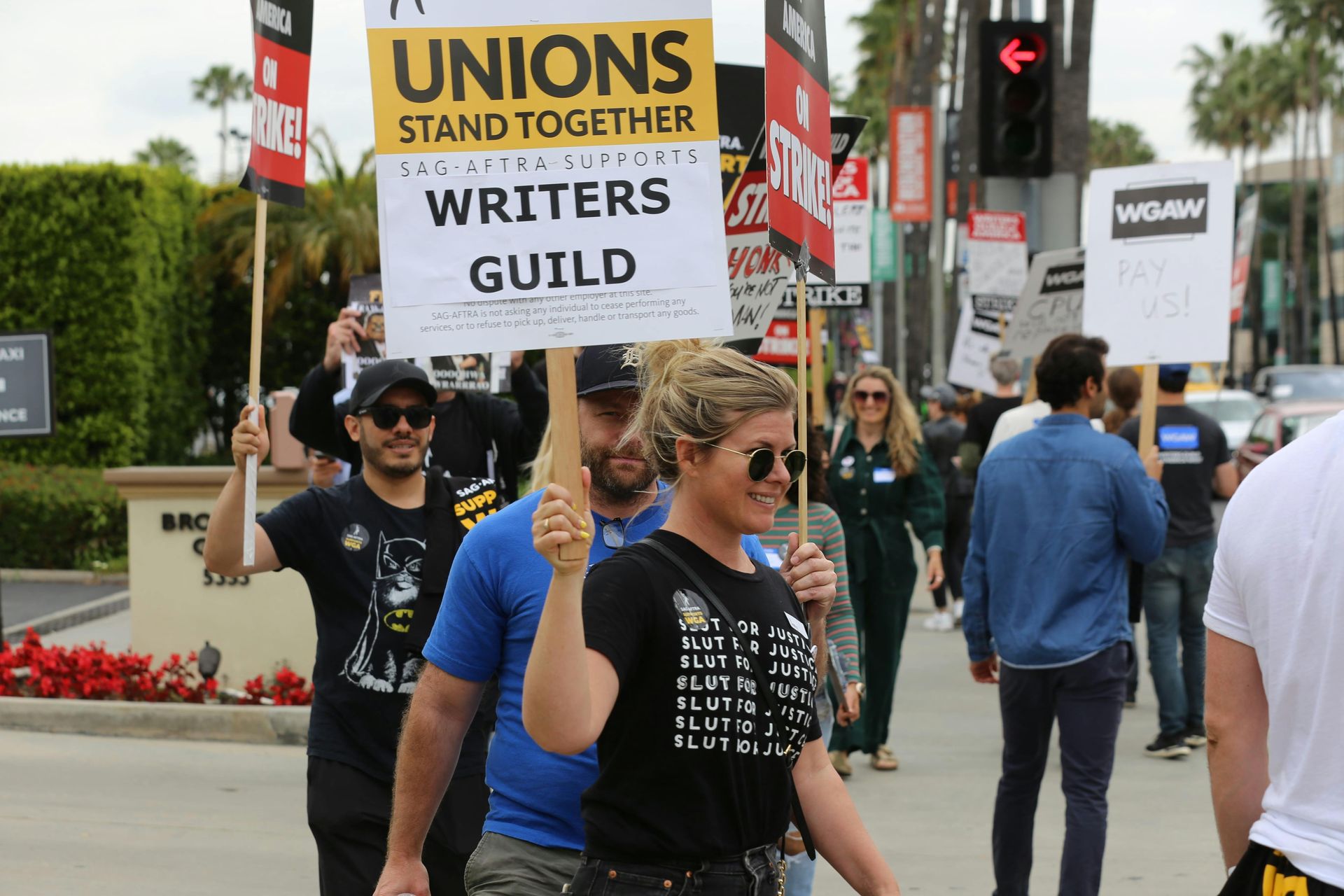Labor Strikes: Key Moments in Entertainment

The history of labor strikes in the entertainment industry is as rich and complex as the industry itself. From the early days of Hollywood to the present, labor strikes have played a significant role in shaping the landscape of film and television production. We'll review the impact of labor strikes over time and highlight the key events, unions, and issues that have defined labor strikes in the entertainment industry.
Early Beginnings
The roots of labor strikes in the entertainment industry can be traced back to the early 20th century. In 1893 the International Alliance of Theatrical Stage Employees (IATSE) was formed, with the Teamsters and several other key unions being formed in the early 1900s. In the 1930s, the Screen Actors Guild (SAG) and the Writers Guild of America (WGA) were established to protect the rights of actors and writers, respectively. These unions were instrumental in advocating for fair wages, better working conditions, and residual payments for their members.
The Rise of Unions
The 1960s: A Decade of Change
The 1960s was a transformative decade for the entertainment industry. The advent of television and the decline of the studio system led to significant changes in the way films and TV shows were produced. During this period, labor strikes became more common as unions fought for better compensation and working conditions in a rapidly evolving industry.
Major Strikes in the Entertainment Industry
The 1988 Writers Guild of America Strike
The 1988 WGA strike was one of the longest and most significant labor strikes in the entertainment industry's history. Lasting for 22 weeks, the strike centered around issues such as residual payments for content broadcast on new media platforms, including cable television and home video. The strike had a profound impact on the industry, leading to changes in how writers were compensated for their work.
The 2007-2008 Writers Guild of America Strike
The 2007-2008 WGA strike lasted for 100 days and focused on the issue of compensation for content distributed through new media, particularly the internet. The strike led to significant disruptions in television production, with many shows being delayed or canceled. Ultimately, the strike resulted in a new contract that provided writers with a share of revenue generated from digital distribution.
The 2021 IATSE Strike Threat
In 2021, the International Alliance of Theatrical Stage Employees (IATSE) came close to striking over issues such as long working hours, inadequate rest periods, and insufficient pay for streaming content. The strike was averted at the last minute with a tentative agreement that addressed many of the union's concerns. This event highlighted the ongoing challenges faced by workers in the entertainment industry, particularly in the era of streaming.
Recent Developments
The Impact of AI on the Industry
Artificial Intelligence (AI) has become a significant point of contention in the entertainment industry. Unions such as SAG, WGA, and DGA have raised concerns about the potential impact of AI on jobs and creative control. The use of AI in scriptwriting, editing, and even acting poses new challenges for labor relations, as unions strive to protect their members' interests in an increasingly automated industry.
The 2023 SAG-AFTRA and WGA Strikes
In 2023, the Screen Actors Guild-American Federation of Television and Radio Artists (SAG-AFTRA) and the Writers Guild of America both went on strike over issues including residual payments from streaming services and the use of AI in the industry. The strikes, both of which lasted for several weeks, resulted in new contracts that addressed many of the union's demands, including better compensation for streaming content and protections against the misuse of AI.
The Role of Residuals
Residuals, or payments made to union entertainment industry professionals for the reuse of their work, have been a central issue in many labor strikes. The advent of new media platforms, such as streaming services, has complicated the issue of residuals, as unions fight to ensure that their members are fairly compensated for their work in an ever-changing landscape.
The Importance of Collective Bargaining
Collective bargaining agreements (CBAs) are the foundation of labor relations in the entertainment industry. These agreements set the terms and conditions of employment, including wages, working hours, and benefits. Effective collective bargaining is essential for maintaining fair labor practices and ensuring that workers' rights are protected.
Key Components of CBAs
- Wages: CBAs establish minimum wage rates for different job categories, ensuring that workers are paid fairly for their work.
- Working Conditions: CBAs set standards for working hours, rest periods, and safety protocols to protect workers' health and well-being.
- Benefits: CBAs provide for various benefits, such as health insurance, retirement plans, and paid leave, to support workers' overall quality of life.
Residuals: CBAs include provisions for residual payments, ensuring that workers are compensated for the reuse of their work.
The history of labor strikes in the entertainment industry is a testament to the ongoing struggle for fair labor practices and workers' rights. From the early days of Hollywood to the present, unions have played a crucial role in advocating for better wages, working conditions, and benefits for their members. As the industry continues to evolve, particularly with the rise of new media and AI, labor relations will remain a critical aspect of the entertainment landscape.
Understanding the complexities of collective bargaining agreements and union contracts is essential for anyone involved in film and television production. By staying informed about the history and current developments in labor strikes, producers and production finance professionals can navigate the intricacies of payroll and labor management with confidence, ensuring that they effectively manage union agreements and support fair labor practices.
For those in the industry, ongoing education and awareness are key to staying abreast of the latest developments and ensuring that you are prepared to address the challenges and opportunities that arise in the ever-changing world of entertainment labor relations.









